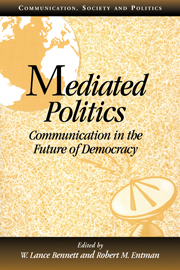Book contents
- Frontmatter
- Contents
- List of Figures
- List of Tables
- Contributors
- Preface
- Acknowledgments
- 1 Mediated Politics: An Introduction
- Part 1 Democracy and the Public Sphere
- Part 2 Citizens, Consumers, and Media in Transition
- 5 Reporting and the Push for Market-Oriented Journalism: Media Organizations as Businesses
- 6 Political Discourse and the Politics of Need: Discourses on the Good Life in Cyberspace
- 7 Dividing Practices: Segmentation and Targeting in the Emerging Public Sphere
- 8 Let Us Infotain You: Politics in the New Media Environment
- 9 The Future of the Institutional Media
- Part 3 Mediated Political Information and Public Opinion
- Part 4 Mediated Campaigns
- Part 5 Citizens: Present and Future
- Index
9 - The Future of the Institutional Media
Published online by Cambridge University Press: 05 June 2012
- Frontmatter
- Contents
- List of Figures
- List of Tables
- Contributors
- Preface
- Acknowledgments
- 1 Mediated Politics: An Introduction
- Part 1 Democracy and the Public Sphere
- Part 2 Citizens, Consumers, and Media in Transition
- 5 Reporting and the Push for Market-Oriented Journalism: Media Organizations as Businesses
- 6 Political Discourse and the Politics of Need: Discourses on the Good Life in Cyberspace
- 7 Dividing Practices: Segmentation and Targeting in the Emerging Public Sphere
- 8 Let Us Infotain You: Politics in the New Media Environment
- 9 The Future of the Institutional Media
- Part 3 Mediated Political Information and Public Opinion
- Part 4 Mediated Campaigns
- Part 5 Citizens: Present and Future
- Index
Summary
Nowadays, almost everyone assumes the news media are powerful in one way or another. How, when, where, and why this occurs, and for good or for ill, brings considerably less consensus. Different conceptions of journalism and theories of what shapes the news and thus of the news media's power abound (see Gans 1979, pp. 78–79). Journalists protest that they hold a mirror up to reality, a notion that has been debunked by the constant preference over time for only certain newsmakers, subject matters, and storylines. Critics on various points on the left–right continuum contend instead that biased news stems from journalists’ particular ideological stances – whether their own or that of the news organization for which they work (Lichter et al. 1986, p. 1996) – yet this begs the question of how this can occur given journalists’ explicit and conscientious exclusion of personal values and dogged pursuit of neutrality, if not objectivity (Tuchman 1972; Gans 1979; Weaver and Wilhoit 1996).
Perhaps the dominant explanation among scholars is the role of the news media as organizations having to crank out a predictable amount of news weekly, daily, even hourly nowadays, even though what is news is all but undefinable. In the process of “routinizing the unexpected” (Tuchman 1973), the organizational approach contends that the news gravitates only toward those news sources and subject matters that can easily and efficiently provide opportunities for news on a regular, recurring basis. Although the organizational approach helps us understand the role of powerful authoritative sources, the centrality of news beats and the repetition of news formulas (e.g., Epstein 1973; Sigal 1973; Tuchman 1978), there is much that cannot be explained by it.
- Type
- Chapter
- Information
- Mediated PoliticsCommunication in the Future of Democracy, pp. 182 - 200Publisher: Cambridge University PressPrint publication year: 2000
- 1
- Cited by



